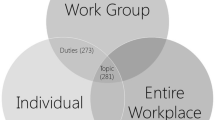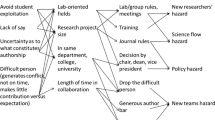Abstract
This qualitative study explores how life science postdocs’ perceptions of contemporary academic career rationales influence how they relate to collaboration within research groups. One consequential dimension of these perceptions is the high value assigned to publications. For career progress, postdocs consider producing publications and especially first author publications essential. This strong focus on publications is influential for how postdocs prefer to organize the socio-epistemic processes of their research work. To ensure first authorship, avoid authorship conflicts and keep the number of co-authors low, they articulate a preference for working mainly individually. Existing collaborations and support relationships are frequently assessed in terms of whether they will have to share or lose authorship. Hence, while formally, the life sciences have become more collaborative, postdocs report that in their day-to-day practices, they try to avoid collaboration. By drawing attention to this tension, the author aims to contribute to a growing debate about incentive systems in academic science and their unexpected negative side effects.
Similar content being viewed by others
Notes
This article is part of the author's Ph.D. thesis (2012) ‘On Becoming a “Distinguished” Scientist. Individuality and Collectivity in Postdoctoral Life Scientists' Narratives about Living and Working in the Academic Sciences.
There is a more recent option of marking two others on a paper as having equally contributed to a publication. See section ‘Individualized Projects as Guarantees for First Authorships’ on how postdocs read this convention.
For example, New England Journal of Medicine (1997; Updated in 2010, http://www.icmje.org/urm_full.pdf) or Nature (2009)
Funded by the Austrian Genome Program GEN-AU (bmwf); September 2007–December 2010; Project leader: Ulrike Felt; Main collaborators: Max Fochler, Ruth Müller, http://sciencestudies.univie.ac.at/en/research/completed-projects/living-changes-in-the-life-sciences/
The overall sample contained interviews with 19 postdocs. Two were excluded because of the special status (non-group member postdocs right after completion of Ph.D.; junior group leader); two were excluded because the postdocs turned out to work in more industrial type research setting than initially expected, and hence the whole institution was excluded from further analysis of academic career settings.
Re-thinking Biosciences as Culture and Practice. Tracing ‘Ethics’ and ‘Society’ in Genome Research. March 2006–June 2007, http://sciencestudies.univie.ac.at/en/research/completed-projects/gold-ii/
Some of these age limits have recently been replaced by time limits, such as numbers of years passed since Ph.D. graduation, for example, in the case of the prestigious ‘Start Program’ of the Austrian Science Fond FWF.
See, for example, a report in the Viennese weekly magazine Falter from 11 January 2012, http://www.falter.at/web/print/detail.php?id=1548
References
Abt, H.A. (2007) ‘The future of single-authored papers’, Scientometrics 73 (3): 353–358.
Ackers, L. (2008) ‘Internationalisation, mobility and metrics: A new form of indirect discrimination?’ Minerva 46 (4): 411–435.
Angrosino, M.V. (1997) ‘Among the savage anthros: Reflections on the SAS oral history project’, Southern Anthropologist 24 (2): 25–32.
Angrosino, M.V. and Mays de Perez, K.A. (2003) ‘Rethinking Observation: From Method to Context’, in N.K. Denzin and Y.S. Lincoln (eds.) Collecting and Interpreting Qualitative Materials, 2nd edn., Thousand Oaks, CA: Sage, pp. 673–702.
Biagioli, M. (1998) ‘The instability of authorship: credit and responsibility in contemporary biomedicine’, The FASEB Journal 12 (1): 3–16.
Blumer, H. (1954) ‘What is wrong with social theory?’ American Sociological Review 18 (1): 3–10.
Blumer, H. (1969) Symbolic Interactionism. Perspective and Method, Englewood Cliffs, NJ: Prentice-Hall.
Bowen, G.A. (2006) ‘Grounded theory and sensitizing concepts’, International Journal of Qualitative Methods 5 (3): 1–9.
Bourdieu, P. (1975) ‘The specificity of the scientific field and the social conditions of the progress of reason’, Social Science Information 14 (6): 19–47.
Chamaz, K. (2006) Constructing Grounded Theory. A Practical Guide for Qualitative Analysis, London: Sage.
Edge, D. (1979) ‘Quantitative measurements of communication in science: A critical review’, History of Science 17: 102–134.
European Commission. (2000) Presidency Conclusions, Lisbon: European Council.
Felt, U. (ed) (2009) Knowing and Living in Academic Research. Convergence and Heterogeneity in Research Cultures in the European Context, Prague: Institute of Sociology of the Academy of Sciences of the Czech Republic.
Felt, U. and Fochler, M. (2013) ‘The reflexive peer-to-peer-interview. Developing a method to study the intertwinement of epistemic, institutional and social aspects in scientists’ biographical narratives’, Qualitative Research, Manuscript in preparation.
Felt, U., Fochler, M. and Strassnig, M. (2010) ‘Experimente partizipativer ELSA-forschung. Eine methodenpolitische reflexion’, in E. Grießler and H. Rohracher (eds.) Genomforschung – Politik – Gesellschaft. Perspektiven auf ethische, rechtliche und soziale Aspekte der Genomforschung, Sonderband ÖZS, Wiesbaden: VS Verlag, pp. 33–67.
Fontana, A. and Frey, J.H. (2003) ‘The Interview: From Structured Questions to Negotiated Text’, in N.K. Denzin and Y.S. Lincoln (eds.) Collecting and Interpreting Qualitative Materials, Thousand Oaks, CA: Sage, pp. 61–106.
Gunasekara, C. (2007) ‘Pivoting the centre: Reflections on undertaking qualitative interviewing in academia’, Qualitative Research 7 (4): 461.
Hackett, E. (ed) (2005) ‘Special guest-edited issue on scientific collaboration’, Social Studies of Science 35 (5): 667–672.
Hammersley, M. and Atkinson, P. (1983) Ethnography. Principles in Practice, London & New York: Tavistock.
Heinze, T. and Kuhlmann, S. (2008) ‘Across institutional boundaries? Research collaboration in German public sector nanoscience’, Research Policy 37 (5): 888–899.
Holstein, J.A. and Gubrium, J.F. (1997) ‘Active interviewing’, in D. Silverman (ed.) Qualitative research: Theory, Method and Practice, Thousand Oaks, CA: Sage, pp. 113–129.
Katz, J.S. and Martin, B.R. (1997) ‘What is research collaboration?’ Research Policy 26 (1): 1–18.
Knorr-Cetina, K. (1999) Epistemic Cultures. How the Sciences Make Knowledge, Cambridge, MA: Harvard University Press.
Krücken, G., Kosmützky, A. and Torka, M. (eds) (2007) Towards a Multiversity? Universities between Global Trends and National Traditions, Bielefeld: Transcript.
Laudel, G. (2001) ‘Collaboration, creativity and rewards: Why and how scientists collaborate’, International Journal of Technology Management 22 (7/8): 762–781.
Laudel, G. (2002) ‘What do we measure by co-authorships?’ Research Evaluation 11 (1): 3–15.
Laudel, G. and Gläser, J. (2008) ‘From apprentice to colleague: The metamorphosis of early career researchers’, Higher Education 55 (3): 387–406.
Macfarlane, B. (2005) ‘The disengaged academic: The retreat from citizenship’, Higher Education Quarterly 59 (4): 296–312.
Merton, R.K. (1942) The Sociology of Science. Theoretical and Empirical Investigations, Chicago: University of Chicago Press.
Müller, R. and Kenney, M.J. (2013) ‘Agential conversations. On interviewing life scientists and the politics of mundane research practices’, Science as Culture, Submitted manuscript.
Nature. (2003) ‘Victims of success’, Nature 422 (6929): 354–355.
Nature. (2009) ‘Authorship policies. Editorial’, Nature 458 (7242): 1078.
Nowotny, H. and Felt, U. (1997) After the Breakthrough. The Emergence of High-Temperature Superconductivity as a Research Field, Cambridge: Cambridge University Press.
Nowotny, H., Scott, P. and Gibbons, M. (2001) Re-thinking Science. Knowledge in an Age of Uncertainty, Cambridge: Polity.
Parker, J.N., Vermeulen, N. and Penders, B. (eds) (2010) Collaboration in the New Life Sciences, Farnham/Burlington: Ashgate.
Pickstone, J.V. (2000) Ways of Knowing. A New History of Science, Technology and Medicine, Chicago: University of Chicago Press.
Power, M. (1997) The Audit Society. Rituals of Verification, Oxford: Oxford University Press.
Price, D.J.de Solla (1963) Little Science, Big Science, New York: Columbia University Press.
Salonius, A. (2012) ‘Social organization of work in biomedical labs in leading universities in Canada: Socio-historical dynamics and the influence of research funding’, Social Studies of Science, Manuscript accepted pending revisions.
Scaffidi, A.K. and Berman, J.E. (2011) ‘A positive postdoctoral experience is related to quality supervision and career mentoring, collaborations, networking and a nurturing research environment’, Higher Education 62 (6): 1–14.
Science. (2005) ‘Not your father’s postdoc. Editorial feature’, Science 308 (5722): 717–718.
Science. (2010) ‘Promoting scientific standards. Editorial’, Science 327 (5961): 12.
Shapin, S. (1990) ‘The mind is its own place. Science and solitude in seventeenth-century England’, Science in Context 4 (1): 91–218.
Shrum, W.M. (2010) ‘Collaborationism’, in J.N. Parker, N. Vermeulen and B. Penders (eds.) Collaboration in the New Life Sciences, Farnham/Burlington: Ashgate, pp. 247–258.
Shrum, W.M., Genuth, J. and Chompalov, I. (2007) Structures of Scientific Collaborations, Cambridge, MA & London: MIT Press.
Silverman, D. (2006) Interpreting Qualitative Data. Methods for Analysing Talk, Text and Interaction, London: Sage.
Sommerlund, J. and Boutaiba, S. (2007) ‘Borders of the boundaryless career’, Journal of Organizational Change Management 20 (4): 525–538.
Stephan, P. (2012) How Economics Shapes Science, Cambridge: Harvard University Press.
Strathern, M. (ed) (2000) Audit Cultures. Anthropological Studies in Accountability, Ethics and the Academy, London: Routledge.
Strauss, A. and Corbin, J. (1998) Basics of Qualitative Research. Techniques and Procedures for Developing Grounded Theory 2nd edn., Thousand Oaks, London & New Delhi: Sage.
The Scientist. (2006) ‘Are we training too many scientists?’ The Scientist 20 (9): 42.
The Scientist. (2007) ‘Managing authorship’, The Scientist 21 (11): 92.
Torka, M. (2009) Die Projektförmigkeit der Forschung. Wissenschafts- und Technikforschung 3, Baden-Baden: Nomos.
van den Hoonaard, W.C. (1997) Working with Sensitizing Concepts: Analytical Field Research, Thousand Oaks, CA: Sage.
Vermeulen, N. (2009) Supersizing Science: On Building Large-Scale Research Projects in Biology, Maastricht: Maastricht University Press.
Weinberg, A.M. (1961) ‘Impact of large-scale science on the United States’, Science 134 (3473): 161–164.
Wray, K.B. (2002) ‘The epistemic significance of collaborative research’, Philosophy of Science 69 (1): 150–168.
Wray, K.B. (2006) ‘Scientific authorship in the age of collaborative research’, Studies in History and Philosophy of Science 37 (3): 505–514.
Ynalvez, M.A. and Shrum, W.M. (2010) ‘Professional networks, scientific collaboration, and publication productivity in resource-constrained research institutions in a developing country’, Research Policy 40 (2): 204–216.
Acknowledgements
This paper is based on research conducted in the research project ‘Living Changes in the Life Sciences’, funded by GEN-AU/BMWF (Project leader: Ulrike Felt; main collaborators: Maximilian Fochler, Ruth Müller). At the moment of initially drafting this paper, the author was funded by a research fellowship of the University of Vienna for her Ph.D. thesis, which this paper is part of. The author thankfully acknowledges the valuable input of her supervisor Ulrike Felt and her dear colleague Max Fochler. Moreover, I would like to thank my friends and peers Cornelia Schadler, Martha Kenney, Michael Penkler and Kay Felder for their helpful feedback. Finally, I would like to thank the three anonymous reviewers of Higher Education Policy, whose thoughtful comments helped improve this paper in the review process. This paper was first presented at the conference ‘EASST 2010: Practicing Science and Technology, Performing the Social’ (Trento, 2–4 September 2010). Many thanks to Inge van der Weijden, Peter van den Besselaar and Sven Hemlin for organizing the track ‘Organization of Science Practices’ and for inviting this paper to this special issue of Higher Education Policy.
Author information
Authors and Affiliations
Rights and permissions
About this article
Cite this article
Müller, R. Collaborating in Life Science Research Groups: The Question of Authorship. High Educ Policy 25, 289–311 (2012). https://doi.org/10.1057/hep.2012.11
Published:
Issue Date:
DOI: https://doi.org/10.1057/hep.2012.11




